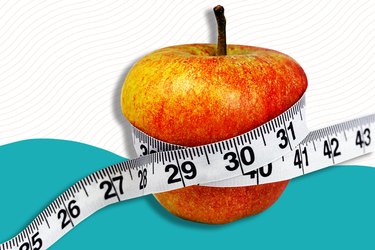
Feverish hot flashes, nasty night sweats, decreased sexual desire. What we hear about menopause's side effects is notoriously negative. While menopause — defined as 12 consecutive months without a period — produces a lot of changes in your body that aren't always pleasant, all the fear and dread surrounding the topic certainly don't help to temper this life transition.
The best thing you can do to curb anxiety about menopause is to become well-informed. That's why we enlisted Stephanie Hack, MD, MPH, a board-certified ob-gyn and host of the Lady Parts Doctor podcast, to help us separate fact from fiction by debunking eight common menopause myths.
Video of the Day
Video of the Day
Myth 1: Menopause Automatically Starts in Your 50s
While the median age of menopause is 51, many will enter the menopausal transition (known as perimenopause) much earlier or later, Dr. Hack says.
In fact, there's a considerably wider age range for menopause than most of us realize. The majority of people begin phasing into menopause at some point between the ages of 40 and 58, but some start as early as their 30s or as late as their 60s, according to The University of Vermont Health Network.
The takeaway? Every person's menopausal timeline is unique.
Myth 2: Menopause Only Causes Hot Flashes
The term "hot flash" is practically synonymous with menopause. Indeed, with more than 70 percent of people experiencing this sweaty symptom, per AARP, it's fair to say hot flashes are a mainstay of the menopausal transition.
But they're not the whole picture of perimenopause or menopause. In addition to hot flashes, vaginal dryness, disrupted sleep, painful sex, mood changes and worsening memory are all potential side effects of fluctuating hormones, Dr. Hack says.
While every menopausal person will experience a different set of symptoms, knowing that your body can respond in a variety of ways may help you feel less blindsided when your hormones hit this stage.
Myth 3: There’s Nothing You Can Do to Relieve Menopause Symptoms
Many menopausal people mistakenly believe that hot flashes and other uncomfortable symptoms are par for the course — an unfortunate fact of life that you must grin and bear without any relief.
But you don't have to accept or suffer through debilitating side effects, especially if they're limiting your quality of life. Instead of waiting until you feel absolutely awful, speak with your doctor, who can discuss different treatment options with you.
Hormone therapy (more on this later) as well as certain antidepressants, blood pressure and seizure medications can improve menopause-related symptoms, Dr. Hack says.
Other natural remedies — such as supplements containing a plant compound called phytoestrogen — have also been found to reduce the frequency of hot flashes and vaginal dryness, according to a June 2016 systematic review and meta-analysis in JAMA. (Though the researchers pointed out that more studies are needed to confirm this correlation.)
Additionally, lifestyle changes have also been helpful to minimize menopause symptoms, Dr. Hack says. For example, research has shown that a regular exercise routine can reduce hot flashes, boost mood and manage weight in menopausal people, per AARP.
Other natural remedies for hot flashes include wearing layers and using fans to keep cool, limiting hot and spicy foods along with alcohol and caffeine, quitting smoking and practicing meditation and other stress-management techniques.
Myth 4: Menopause Destroys Your Sex Drive
Worried you'll lose your libido during menopause? Don't fret. "Menopause is not a death sentence for sex," Dr. Hack says.
Post-menopausal sexual interest (or lack thereof) is affected by a complex set of factors including psychological wellbeing, the status of your relationship and the way a person feels about sex, aging and femininity, according to the authors of an April 2015 analytic review in Feminism & Psychology.
In other words, the hormonal changes that happen during menopause are just one ingredient in the mix. Which is why menopause affects everyone's sex drive differently.
"Some may feel a decreased interest, while others have the opposite experience," Dr. Hack says.
Indeed, some people get a lift in libido as they age and feel even greater sexual satisfaction, according to The University of Vermont Health Network.
And while certain menopausal symptoms such as vaginal dryness can put a damper on sexual pleasure, there are ways to negate these negative effects, including focusing on foreplay and using a high-quality lubricant, per The University of Vermont Health Network.
Most people are under the misconception that menopause is a guaranteed gateway to weight gain. But weight gain in middle age has more to do with getting older than it does with menopause. "With age, there is a decrease in muscle mass and an increase in fat," Dr. Hack says.
Though menopause itself doesn't pack on the pounds, the dip in your postmenopausal estrogen levels can shift fat stores from your hips and thighs to your stomach, according to AARP.
"While maintaining your weight may become more difficult, it is not impossible" to do during menopause, Dr. Hack says. Practicing the following lifestyle modifications can help mitigate menopause's effects, per The University of Vermont Health Network:
- Incorporate strength training into your exercise regimen to maintain muscle mass
- Pack your plate with more satiating fiber-rich vegetables and healthy fats
- Limit alcohol, caffeine, sugar and processed foods to improve your daytime energy and quality of sleep
If these strategies are unsuccessful in helping you sustain a healthy weight, consult with a healthcare professional who can further assess your situation. Other underlying medical issues may be instigating weight gain such as high insulin or an underactive thyroid.
Myth 6: You Can't Get Pregnant Right Before Menopause
Think it's impossible to get pregnant during perimenopause? "While rare, I have had patients in their late 40s and early 50s — who thought they had gone through menopause — discover that they were pregnant," Dr. Hack says.
Here's how this can happen: Until a whole year has passed without a period, you can still technically conceive. Put another way: "If you are still ovulating, you could potentially get pregnant," Dr. Hack says.
So, if you don't want to leave your pregnancy odds to chance, it's still important to discuss birth control options with your health care provider during perimenopause, she adds.
Myth 7: Hormone Therapy Is Dangerous
Hormone therapy (HT) — which entails taking high doses of estrogen — is considered one of the most effective treatments for menopause symptoms.
By hindering hot flashes and night sweats, HT improves sleep, fatigue, mood, concentration and overall quality of life for symptomatic menopausal people, according to the North American Menopause Society (NAMS). It also decreases vaginal dryness, and, in the process, painful sex.
Plus, HT preserves bone density, reducing your odds of osteoporosis and fractures, per the NAMS.
But this helpful therapy is not without risks. Depending on how long you take the medicine and at what age you start, HT can slightly increase your incidence of developing breast cancer, heart disease, stroke, blood clots and/or dementia in certain populations, according to the NAMS.
"While hormone therapy is contraindicated for some, it is safe for others to use," Dr. Hack says. In fact, for most healthy individuals assigned female at birth (AFAB) who are under the age of 60, HT's big benefits trump the potential risks, per the NAMS.
"Your health care provider should review your history to make sure you are a good candidate," Dr. Hack says. "If you are not, don't worry — we have non-hormonal options that can help with your symptoms as well."
Myth 8: Menopause Is the Same for Everyone
"We are individuals," Dr. Hack says. "While some [menopause] symptoms are common, everyone is affected differently."
Put another way: The frequency and severity of the side effects that you may experience vary from person to person. For example, for some, hot flashes may be agitating enough to disrupt daily functioning while others may only count them as a mild inconvenience. And a lucky few will never feel a hot flash during this phase of life.
All this is to say, each person's menopausal journey is distinct, and there's no definitive way to predict what yours may entail.
- The University of Vermont Health Network: “Don’t Sweat It: Busting Six Menopause Myths”
- North American Menopause Society: “Deciding About Hormone Therapy Use”
- AARP: “Menopause Myth Buster Every Woman Needs to Read”
- JAMA: “Use of Plant-Based Therapies and Menopausal Symptoms: A Systematic Review and Meta-analysis”
- Feminism & Psychology: “Sex and the menopausal woman: A critical review and analysis”
Is this an emergency? If you are experiencing serious medical symptoms, please see the National Library of Medicine’s list of signs you need emergency medical attention or call 911.








